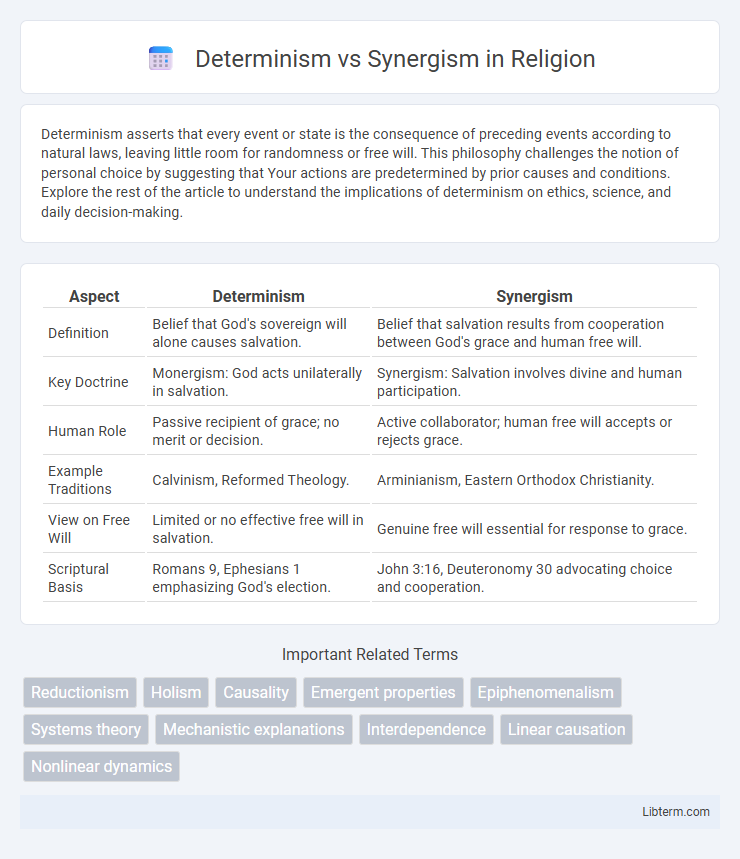Determinism asserts that every event or state is the consequence of preceding events according to natural laws, leaving little room for randomness or free will. This philosophy challenges the notion of personal choice by suggesting that Your actions are predetermined by prior causes and conditions. Explore the rest of the article to understand the implications of determinism on ethics, science, and daily decision-making.
Table of Comparison
| Aspect | Determinism | Synergism |
|---|---|---|
| Definition | Belief that God's sovereign will alone causes salvation. | Belief that salvation results from cooperation between God's grace and human free will. |
| Key Doctrine | Monergism: God acts unilaterally in salvation. | Synergism: Salvation involves divine and human participation. |
| Human Role | Passive recipient of grace; no merit or decision. | Active collaborator; human free will accepts or rejects grace. |
| Example Traditions | Calvinism, Reformed Theology. | Arminianism, Eastern Orthodox Christianity. |
| View on Free Will | Limited or no effective free will in salvation. | Genuine free will essential for response to grace. |
| Scriptural Basis | Romans 9, Ephesians 1 emphasizing God's election. | John 3:16, Deuteronomy 30 advocating choice and cooperation. |
Introduction to Determinism and Synergism
Determinism in theology asserts that divine sovereignty preordains all events, emphasizing God's absolute control over salvation and human actions. Synergism, by contrast, emphasizes cooperative interaction between divine grace and human free will in the process of salvation. This debate centers on the extent of human agency versus divine intervention in spiritual outcomes.
Defining Determinism: Theoretical Foundations
Determinism is grounded in the principle that all events and actions are causally determined by preceding factors, implying a predictable and necessary chain of cause and effect within natural laws. Theoretical foundations of determinism draw from classical physics, philosophy of causality, and metaphysics, emphasizing that every state of affairs results inevitably from prior states. This framework contrasts with synergism by asserting that free will and random events do not influence outcomes, thereby upholding a strict, mechanistic universe.
Understanding Synergism: Core Concepts
Synergism emphasizes the collaborative interaction of multiple factors or agents producing an effect greater than the sum of their individual contributions, highlighting the importance of interdependence in complex systems. Core concepts include mutual reinforcement, where different elements enhance each other's effectiveness, and dynamic interplay, which drives emergent outcomes not predictable from isolated components. Understanding synergism involves analyzing networked relationships and feedback loops that amplify results beyond deterministic cause-and-effect chains.
Historical Perspectives on Determinism vs Synergism
Historical perspectives on determinism trace back to classical philosophies where fate and causal laws governed human actions, notably in Stoicism and early mechanistic worldviews. Synergism emerged prominently in theological debates, especially within Christian thought, emphasizing cooperative interaction between divine grace and human free will, such as in the writings of Augustine and later in the Thomistic tradition. The tension between deterministic frameworks and synergistic models shaped foundational discussions in metaphysics, ethics, and theology, influencing Enlightenment and modern interpretations of human agency.
Key Differences Between Determinism and Synergism
Determinism posits that events are caused by preceding factors in a linear, predictable manner, emphasizing cause and effect without external influence. Synergism asserts that outcomes result from the combined, interactive effects of multiple causes working together, creating effects greater than the sum of individual parts. The key difference lies in determinism's unidirectional causality versus synergism's interactive, multiplicative influence on results.
Applications in Science and Philosophy
Determinism posits that every event, including human actions, is the inevitable result of preceding causes, which heavily influences scientific fields like physics and biology through predictive modeling and cause-effect analyses. Synergism, emphasizing interactive causality where combined factors create outcomes greater than individual effects, is pivotal in systems biology, ecology, and philosophy of mind, illustrating complex interactions beyond linear causation. Philosophically, determinism raises debates about free will and moral responsibility, while synergism supports holistic and emergent perspectives, challenging reductionist interpretations in both metaphysics and ethics.
Impacts on Human Behavior and Society
Determinism posits that human behavior is governed by causal laws or preexisting conditions, limiting free will and often implying predictable social outcomes. Synergism emphasizes the interactive influence between individual agency and external factors, fostering adaptability and complex social dynamics. These contrasting frameworks shape debates on moral responsibility, social policies, and the potential for behavioral change within societies.
Criticisms and Limitations of Both Views
Determinism faces criticism for its reductionist stance, often disregarding human free will and moral responsibility, while Synergism is challenged for its lack of empirical clarity and potential theological inconsistencies, particularly in explaining the precise interaction between divine grace and human freedom. Both views struggle to fully reconcile the paradox of divine sovereignty and human autonomy, with Determinism criticized for potentially rendering human choices illusory and Synergism for complicating the mechanism of salvation without definitive scriptural consensus. The limitations lie in their respective capacities to provide a coherent and universally accepted framework that addresses the complexities of predestination, grace, and human agency.
Contemporary Debates and Research
Contemporary debates on determinism vs synergism center on the balance between preordained factors and collaborative agency in shaping outcomes, with recent research highlighting neurobiological and psychological evidence supporting synergistic models. Advanced studies in genetics, epigenetics, and cognitive neuroscience illustrate how deterministic elements interact dynamically with environmental and social variables, suggesting a complex interplay rather than absolute causality. Current philosophical discourse increasingly integrates empirical findings to challenge classic determinism, promoting synergism as a framework for understanding human behavior and decision-making processes.
Conclusion: Reconciling Determinism and Synergism
Reconciling determinism and synergism involves recognizing the complementary roles of divine sovereignty and human free will in theological frameworks. This balanced perspective affirms that God's predetermined plan operates in harmony with human cooperation, reflecting a dynamic interaction rather than an absolute one-sided control. Embracing this synthesis fosters nuanced understanding of grace and responsibility within Christian doctrine.
Determinism Infographic

 libterm.com
libterm.com